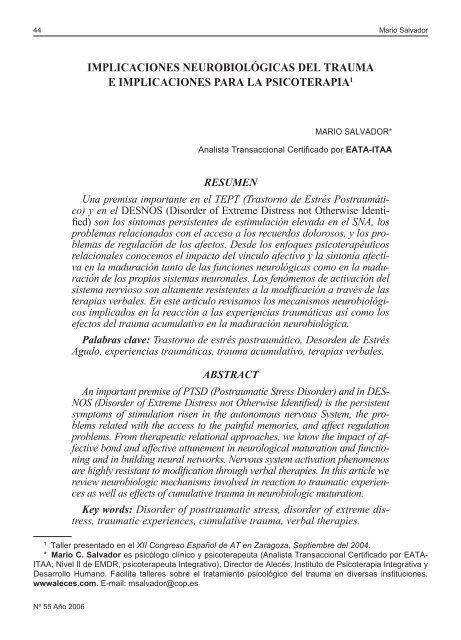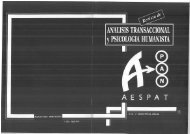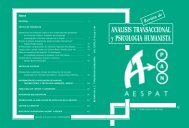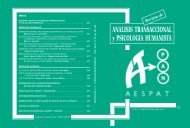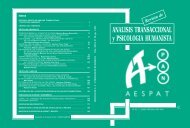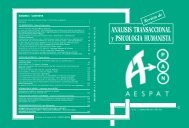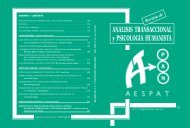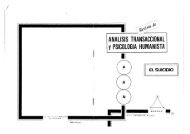Número 55 - Año XXIV - aespat
Número 55 - Año XXIV - aespat
Número 55 - Año XXIV - aespat
Create successful ePaper yourself
Turn your PDF publications into a flip-book with our unique Google optimized e-Paper software.
44 Mario Salvador<br />
Nº <strong>55</strong> <strong>Año</strong> 2006<br />
IMPLICACIONES NEUROBIOLÓGICAS DEL TRAUMA<br />
E IMPLICACIONES PARA LA PSICOTERAPIA 1<br />
MARIO SALVADOR*<br />
Analista Transaccional Certificado por EATA-ITAA<br />
RESUMEN<br />
Una premisa importante en el TEPT (Trastorno de Estrés Postraumático)<br />
y en el DESNOS (Disorder of Extreme Distress not Otherwise Identified)<br />
son los síntomas persistentes de estimulación elevada en el SNA, los<br />
problemas relacionados con el acceso a los recuerdos dolorosos, y los problemas<br />
de regulación de los afectos. Desde los enfoques psicoterapéuticos<br />
relacionales conocemos el impacto del vínculo afectivo y la sintonía afectiva<br />
en la maduración tanto de las funciones neurológicas como en la maduración<br />
de los propios sistemas neuronales. Los fenómenos de activación del<br />
sistema nervioso son altamente resistentes a la modificación a través de las<br />
terapias verbales. En este artículo revisamos los mecanismos neurobiológicos<br />
implicados en la reacción a las experiencias traumáticas así como los<br />
efectos del trauma acumulativo en la maduración neurobiológica.<br />
Palabras clave: Trastorno de estrés postraumático, Desorden de Estrés<br />
Agudo, experiencias traumáticas, trauma acumulativo, terapias verbales.<br />
ABSTRACT<br />
An important premise of PTSD (Postraumatic Stress Disorder) and in DES-<br />
NOS (Disorder of Extreme Distress not Otherwise Identified) is the persistent<br />
symptoms of stimulation risen in the autonomous nervous System, the problems<br />
related with the access to the painful memories, and affect regulation<br />
problems. From therapeutic relational approaches, we know the impact of affective<br />
bond and affective attunement in neurological maturation and functioning<br />
and in building neural networks. Nervous system activation phenomenos<br />
are highly resistant to modification through verbal therapies. In this article we<br />
review neurobiologic mechanisms involved in reaction to traumatic experiences<br />
as well as effects of cumulative trauma in neurobiologic maturation.<br />
Key words: Disorder of posttraumatic stress, disorder of extreme distress,<br />
traumatic experiences, cumulative trauma, verbal therapies.<br />
1 Taller presentado en el XII Congreso Español de AT en Zaragoza, Septiembre del 2004.<br />
* Mario C. Salvador es psicólogo clínico y psicoterapeuta (Analista Transaccional Certificado por EATA-<br />
ITAA; Nivel II de EMDR, psicoterapeuta Integrativo), Director de Alecés, Instituto de Psicoterapia Integrativa y<br />
Desarrollo Humano. Facilita talleres sobre el tratamiento psicológico del trauma en diversas instituciones.<br />
wwwaleces.com. E-mail: msalvador@cop.es


